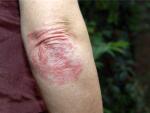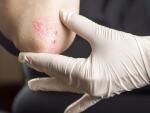I was diagnosed with severe psoriasis at age 8. I had scaly patches of skin covering about 80% of my body. At that age, I didn’t have the self-awareness to care. But when puberty hit, my psoriasis became a huge thing for me. Middle schoolers aren’t the nicest kids, and here’s this girl with large patches of scaly skin on her elbows, knees, and hips with quarter-sized patches everywhere else.
I would get questions about it every day. When an 11-year-old sees white, scaly patches on the arm of the girl sitting next to him, he’s gonna yell, “Ewwww! What’s wrong with you?” Everyone was worried they would catch it, and I’d have to explain what it was. And I couldn’t cover it up—I lived in southern Alabama and it was way too hot for unnecessary clothing. So I just tried to live with it. Add in the fact that I was already 5’10” and weighed maybe 92 pounds and, well, I had a hard time in middle school.
We tried so many different treatments, but nothing really helped. Finally, when I was 15, I was put on a biologic. I started really improving and while the psoriasis didn’t totally clear up, by the time I graduated high school three years later, the patches were just on my joints. I wasn’t completely psoriasis-free until I was 19 and a sophomore in college.
The biologics changed my life. I never thought my skin would be clear. In my mind, I said to myself, “You’re never going to be beautiful. You’re never going to be ‘normal’ looking. You’re never going to be able to do certain things.” That affected how I fit in the world in a big way.
My psoriasis has been clear for about 10 years now. When I think about it, it’s amazing how quickly I forget how it used to be such a constant source of frustration in my life. It just feels so distant. But every so often I have these moments where I’ve been dropped back into it.
A few months ago, I was in the crowd watching the Atlanta gay pride parade. A young guy wearing only a speedo and roller blades skated up by me. He was covered in psoriasis the way I used to be covered—and he was just wearing a speedo! We ended up striking up a conversation; I think he was asking me for directions or something. But while we were talking, this clearly inebriated man walked by and shouted, “Ew, scabies!” and then kept walking. And all of the sudden I was brought back to middle school. That sort of thing happened to me all the time, like an insult drive-by. This young guy was just living in the world, having a great time, celebrating gay pride, and how many times had something like that happened to him that day?
I didn’t say anything because I felt uncomfortable telling him, “I have psoriasis, too; you just can’t tell because I’m lucky and I found a treatment that works for me.” But it was really upsetting and reminded me how things like that used to come out of nowhere constantly; it was like living in a minefield, but no one sees the explosion. You just feel it. And you have to just keep walking in your skin.
I’m so lucky that I found a treatment; that I don’t have to live my life with the understanding that I don’t look “normal.” Psoriasis still affects my life in different ways; I have to figure out how to tell people I’m dating that I have this disease. I can’t follow my dreams of being an actor because I need a more stable life to keep my disease under control. But from a young age, I knew it wasn’t worth getting angry about my psoriasis. I always recognized that psoriasis was just one of the many cards I’ve been dealt. I’m grateful for what I do have.
A native of Eufaula, Alabama, Emma Yarbrough currently lives in Atlanta where she works as an arts administrator and part-time actor. Emma is an avid cook, dancer, and storyteller.




























